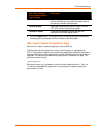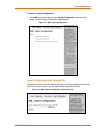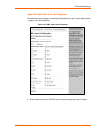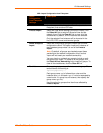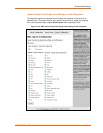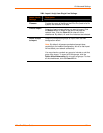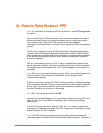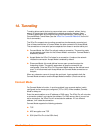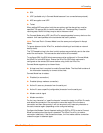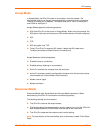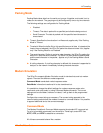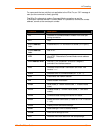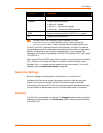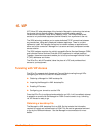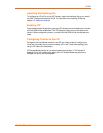
XPort Pro™ User Guide 127
1
1
4
4
.
.
T
T
u
u
n
n
n
n
e
e
l
l
i
i
n
n
g
g
Tunneling allows serial devices to communicate over a network, without “being
aware” of the devices which establish the network connection between them.
Tunneling parameters are configured using the Web Manager (see page 22) or
Command Mode Tunnel Menu (see the
XPort Pro Command Reference for the full
list of commands.)
The XPort Pro supports two tunneling connections simultaneously per serial port.
One of these connections is Connect Mode; the other connection is Accept Mode.
The connections on one serial port are separate from those on another serial port.
Connect Mode: the XPort Pro actively makes a connection. The receiving node
on the network must listen for the Connect Mode’s connection. Connect Mode is
disabled by default.
Accept Mode: the XPort Pro listens for a connection. A node on the network
initiates the connection. Accept Mode is enabled by default.
Disconnect Mode: this mode defines how an open connection stops the
forwarding of data. The specific parameters to stop the connection are
configurable. Once the XPort Pro Disconnect Mode observes the defined event
occur, it will disconnect both Accept Mode and Connect Mode connections on
that port.
When any character comes in through the serial port, it gets copied to both the
Connect Mode connection and the Accept Mode connection (if both are active).
Connect Mode
For Connect Mode to function, it must be enabled, have a remote station (node)
configured, and a remote port configured (TCP or UDP). When enabled, Connect
Mode is always on.
Enter the remote station as an IP address or DNS name. The XPort Pro will not make
a connection unless it can resolve the address. For DNS names, after 4 hours of an
active connection, the XPort Pro will re-evaluate the address. If it is a different
address, it will close the connection.
Connect Mode supports the following protocols:
TCP
AES encryption over TCP
SSH (the XPort Pro is the SSH client)



